Text
10 Countries Names in Katakana Edition (Asia - South/East Asia Edition) - Learning Katakana Script!
<< Part 1
China, Korea & Japan are written in Kanji - so would be skipped from this list :) still I'll write them at the end for anyone who wants to know. I have something bonus at the end of the post hehe!
1. インド (いんど)
2. スリランカ (すりらんか)
3. パキスタン (ぱきすたん)
4. シンガポール (しんがぽーる)
5. べトナム (べとなむ)
6. インドネシヤ (いんどねしや)
7. ブタン (ぶたん)
8. バングラデシュ (ばんぐらでしゅ)
9. ネパール (ねは一る)
10. カンボヅヤ (かんぼじや)
bonus!
1. 日本 (にほん)
meaning: Japan
pronunciation/romanji: ni-ho-n
kanji breakdown: 日→に (meaning: Sun) & 本→ほん (meaning: Book, also origin, basis depending on context the meaning changes). The Kanji essentially means "Sun's Origin" or as Japan is also called "Land of the Rising Sun"
2. 中国 (ちゅうげく)
meaning: China
pronunciation/romanji: chu-u-go-ku
kanji breakdown: 中 -> generally this kanji means "inside, in or center" 国 -> くに (meaning: country). Together we can say these words mean "Center Country" or "Middle Kingdom"
3. 韓国 (かんこく)
meaning: Korea
pronunciation/romanji: ka-n-ko-ku
kanji breakdown: 韓 -> this kanji is referred to as Korea in both Japanese and Mandarin (I believe) and the kanji is taken from Mandarin into Japanese. I couldn't exactly find the meaning of this particular kanji or why has it come to mean Korea, however, if someone knows please do comment or reblog :)
to note: generally Korea is written in Hiragana and not Kanji.
1. インド (いんど)
meaning: India
pronunciation/romanji: i-n-do
2. スリランカ (すりらんか)
meaning: Sri Lanka
pronunciation/romanji: su-ri-ra-n-ka
3. パキスタン (ぱきすたん)
meaning: Pakistan
pronunciation:/romanji pa-ki-su)ta-n
4. シンガポール (しんがぽーる)
meaning: Singapore
pronunciation/romanji: shi-n-ga-poo-ru
5. べトナム (べとなむ)
meaning: Vietnam
pronunciation/romanji: be-te-na-mu
6. インドネシヤ (いんどねしや)
meaning: Indonesia
pronunciation/romanji: i-n-do-ne-shi-ya
7. ブタン (ぶたん)
meaning: Butan
pronunciation/romanji: bu-ta-n
8. バングラデシュ (ばんぐらでしゅ)
meaning: Bangladesh
pronunciation/romanji: ba-n-gu-ra-de-shu
9. ネパール (ねは一る)
meaning: Nepal
pronunciation/romanji: ne-paa-ru
10. カンボヅヤ (かんぼじや)
meaning: Cambodia
pronunciation/romaji: ka-n-bo-ji-ya
I wanted to introduce another Kanji, because I believe it is very effective in learning countries and how to say a nationality together.
人
meaning: person
pronounced: ひと (hi-to)
kanji breakdown/usage: this kanji is a person indicator, the pronunciation changes depending on context. for the sake of this post, I will only talk about it's "" (Jin) usage.
When referring to a person from a country you can say "country name [either in kanji or Katakana] + 人" and that it! You can say your nationality :)
Example:
インド人 - Indian (Indo-jin)
日本人 - Japanese (Nihon-jin)
カンボジア人 - Cambodian (Canbojiya-jin)
Basic sentence from this:
I am Indian -> 私はインド人です![watashi wa indojin desu]
- Although people general would just say インド人です (indojin desu) or 私はインド人 (watashi wa indojin)
So, if you made it this far in the post, please do post where you are from / your nationality :)
<< Part 1 | Part 3 >>
#studying katakana#learn kanji#kanji#japanese#learning japanese#japanese vocabulary#japan#katakana#learn japanese#hiragana#日本#country names#studyblr#langblr#study blog#asian languages#linguistics#language stuff#japanese vocab
8 notes
·
View notes
Text
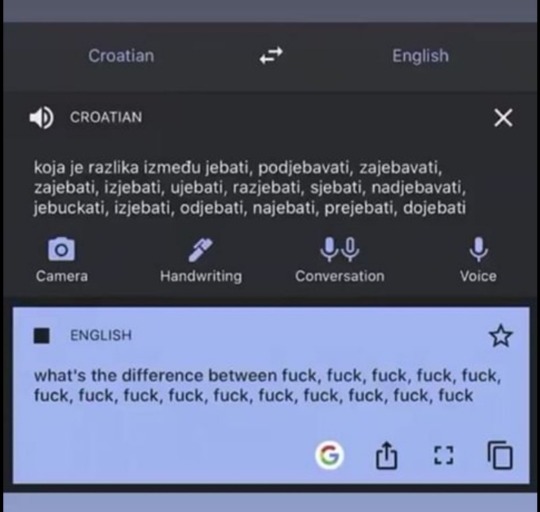
the nuisance of our language is stunning
#language#actually this should be on my language blog#even tho it is dedicated to Japanese as of now#i think people should know this
38K notes
·
View notes
Text
So I just saw a post by a random personal blog that said “don’t follow me if we never even had a conversation before” and?????? Not to be rude but literally what the fuck??????????
I’ve had people (non-pornbots) try to strike conversation out of nowhere in my DMs recently, and now I’m wondering if they were doing that because they wanted to follow me and thought they needed to interact first. I feel compelled to say, just in case, that it’s totally okay to follow this blog (or my side blog, for that matter) even if we’ve never talked before.
Also, I’m legit confused. Is this how follow culture works right now? It was worded like it’s common sense but is that really a thing?
62K notes
·
View notes
Text
In Japanese, they don’t say “moon,” they say “tsuki,” which literally translates to “moon,” and I think that’s how language works.
517K notes
·
View notes
Text
Learning Japanese Script!
Introduction post | Part 1 of ?
1. カタカナ (かたかな)
2. アメリカ (おめりか)
3. テパート (てぱ一と)
4. コンビ二 (こんびに)
5. パン (ぱん)
6. アパート (あぱーと)
7. ベッド (べっど)
8. ホテル (ほてる)
9. コーヒー (こーひー)
10. コピー (こぴー)
meanings
1. カタカナ (かたかな)
meaning - katakana, the script we are trying to read!
romanji - ka-ta-ka-na
Katakana is the script used in Japanese to write the words that belong to other languages.
2. アメリカ (おめりか)
meaning - america
taken from - english (えい語)
romanji/pronunciation - a-me-ri-ka
3. テパート (てぱ一と)
meaning - department store
taken from - English (えい語)
romanji/pronunciation - de-pa(a)-to
4. コンビ二 (こんびに)
meaning - convivence store
taken from - English (えい語)
romanji/pronunciation - co-n-bi-ni
5. パン (ぱん)
meaning - bread
taken from - Portuguese (ポルトガル語, pao) or Spanish (スペイン語, pan)
romanji/pronunciation - pa-n
6. アパート (あぱーと)
meaning - apartment
taken from - English (えい語)
romanji/pronunciation - a-pa(a)-to
7. ベッド (べっど)
meaning - bed
taken from - English (えい語)
romanji/pronunciation - be-d-do
8. ホテル (ほてる)
meaning - hotel
taken from - English (えい語)
romanji/pronunciation - ho-te-ru
9. コーヒー (こーひー)
meaning - coffee
taken from - English (えい語)
romanji/pronunciation - koo-hii
10. コピー (こぴー)
meaning - copy
taken from - English (えい語)
romanji/pronunciation - ko-pii
Introduction Post >> Part 2
#japanese#learning japanese#japanese vocabulary#japan#hiragana#kanji#katakana#learn japanese#anime#studying katakana#日本
13 notes
·
View notes
Text
Learning Japanese Script!
Introduction post | Part 1 of ?
1. カタカナ (かたかな)
2. アメリカ (あめりか)
3. デパート (でぱ一と)
4. コンビ二 (こんびに)
5. パン (ぱん)
6. アパート (あぱーと)
7. ベッド (べっど)
8. ホテル (ほてる)
9. コーヒー (こーひー)
10. コピー (こぴー)
meanings
1. カタカナ (かたかな)
meaning - katakana, the script we are trying to read!
romanji - ka-ta-ka-na
Katakana is the script used in Japanese to write the words that belong to other languages.
2. アメリカ (あめりか)
meaning - america
taken from - english (えい語)
romanji/pronunciation - a-me-ri-ka
3. テパート (てぱ一と)
meaning - department store
taken from - English (えい語)
romanji/pronunciation - de-pa(a)-to
4. コンビ二 (こんびに)
meaning - convivence store
taken from - English (えい語)
romanji/pronunciation - co-n-bi-ni
5. パン (ぱん)
meaning - bread
taken from - Portuguese (ポルトガル語, pao) or Spanish (スペイン語, pan)
romanji/pronunciation - pa-n
6. アパート (あぱーと)
meaning - apartment
taken from - English (えい語)
romanji/pronunciation - a-pa(a)-to
7. ベッド (べっど)
meaning - bed
taken from - English (えい語)
romanji/pronunciation - be-d-do
8. ホテル (ほてる)
meaning - hotel
taken from - English (えい語)
romanji/pronunciation - ho-te-ru
9. コーヒー (こーひー)
meaning - coffee
taken from - English (えい語)
romanji/pronunciation - koo-hii
10. コピー (こぴー)
meaning - copy
taken from - English (えい語)
romanji/pronunciation - ko-pii
<< Introduction Post | Part 2 >>
#japanese#learning japanese#japanese vocabulary#japan#hiragana#kanji#katakana#learn japanese#anime#日本#studying katakana
13 notes
·
View notes
Text
Let's study Japanese Scripts!
I dropped learning Japanese for 6ish months my Hiragana reading remained unaffected but I have mostly forgetten my Katakana other than some basic ァ、イ、ウ、エ、オ. So, I wanted to make a series of posts where anyone who is either completely new to Japanese or just wants to brush up their Katakana reading can use it as a practice.
I'll be tagging all of the posts with #studying katakana so you can directly filter it through that also :)
A few things about this series -
1. I'll put 10 katakana words with their hiragana counterparts, so it'll be easier to read/understand people.
2. I will put the explanation in English (and the where originally the word has been taken from) under a text break, so don't worry if you don't know Hiragana.
3. This is purely a reading (and ig writing for me) practice, I'm not saying this is a guide to learn Katakana, but I am hoping that this would help people get better at reading.
4. This will not include Kanji. I'll probably make a whole different series for that one :))
はい、はじめましょう!
meaning: okay, let's start!
pronunciation/romanji: ha-i, ha-ji-me-ma-sho-u
Part 1
#studying katakana#japanese#learning japanese#japanese vocabulary#japan#hiragana#kanji#katakana#learn japanese#reading practice#studyblr#langblr#langblog#asian languages#language
8 notes
·
View notes
Text
Japanese word of the day
せんせい, Hiragana
先生, Kanji
meaning: teacher, instructor, master
pronunciation/romanji: Sen-se-i

いっしょうにがんばってください!
meaning: let's work together!
pronunciation/romaji: issho ni gambatte kudasai!
#japanese#learning japanese#japanese vocabulary#hiragana#japan#kanji#katakana#learn japanese#anime#日本語#gintama#sakata gintoki#gintoki#ginpachi sensei
18 notes
·
View notes
Text

239 notes
·
View notes
Text
Japanese word of the day
ねこ (Hiragana)
描 (Kanji)
Meaning: cat 🐱
Pronunciation: ne-ko
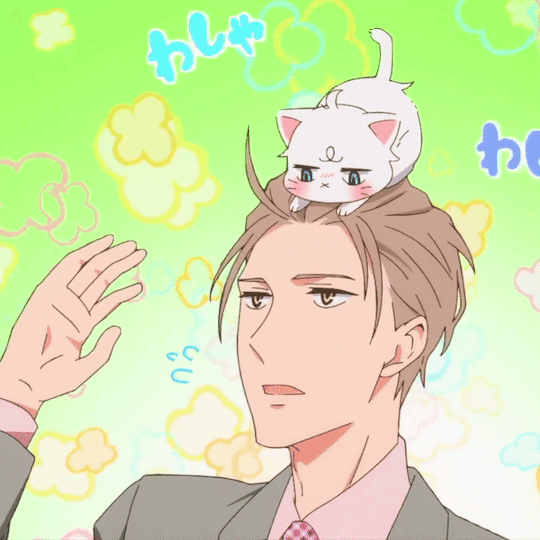
Kanji breakdown:
The kanji for cat is borrowed from Mandarin and can be broken down in these parts: the right side of the kanji "苗 (なえ)" means "sapling" and the left side of the kanji 猫 translates to "ミョゥ" read as "myou" which is essentially the sound that cats make "meow"
this kanji basically means "meow sapling"
please feel free to add any other kanji detail I might've missed. This is my first time learning the kanji as well ~
いしょにべんきょうしましょう!!がんばってね!
Romanji - issho ni benkyo shimayou!! Ganbatte ne!
Translation - let's study together! do your best!
#japanese#learning japanese#japanese vocabulary#hiragana#japan#kanji#katakana#learn japanese#日本#anime#atarashii joushi wa do tennen#cats#neko#cats of tumblr#cute cats#Japanese cats#mandarin
35 notes
·
View notes
Text
Japanese Linguistic Observations in Spy x Family - part 1
This is a post series I've been planning for a while and I've finally had the time to complete part 1! 😃 I may have mentioned here before that I got my B.A. in Japanese/East Asian Studies, and even though I'm not fluent, I know the linguistics of the language fairly well. So I thought it would be fun to examine the interesting aspects of the Japanese version of the SxF manga that aren't reflected in the English translation. It might also be an informative experience for those who don't know any Japanese to learn a bit about the language through SxF! I'll try not to get too technical with the linguistics and keep my explanations at a beginner's level.
-----
Part 1 - Twilight's "honne and tatemae"
One of the main themes in SxF is how many of the characters have secrets they want to hide, so they act a certain way in front of others in order to mask their true selves. Japanese has a word for this phenomena called 本音と建前 ("honne and tatemae").

I remember learning about the concept of "honne and tatemae" during my Japanese college studies – a quick google search will yield a lot of publications on the topic and its relation to Japanese culture in particular. While the idea of hiding one's true intentions behind a fake facade can exist anywhere and is not something unique to Japan, it is enough of an occurrence in Japanese culture that there are specific words for it. The Wiki article has a basic but good definition of honne and tatemae, to quote:
A person's honne may be contrary to what is expected by society or what is required according to one's position and circumstances, and they are often kept hidden, except with one's closest friends. Tatemae is what is expected by society and required according to one's position and circumstances, and these may or may not match one's honne. In many cases, tatemae leads to outright telling of lies in order to avoid exposing the true inward feelings.
Sounds very much like the characters in SxF, doesn't it? Twilight especially, because unlike other characters like Yor and Anya, who simply have secrets they need to keep but don't create fake personas for themselves, Twilight does – the cheerful, friendly Loid Forger is a different person from the cold, calculating Twilight after all. Also unlike Yor and Anya, who speak the same way consistently no matter who they're talking to, Twilight uses different speech levels depending on which persona he's using and who he's talking to.
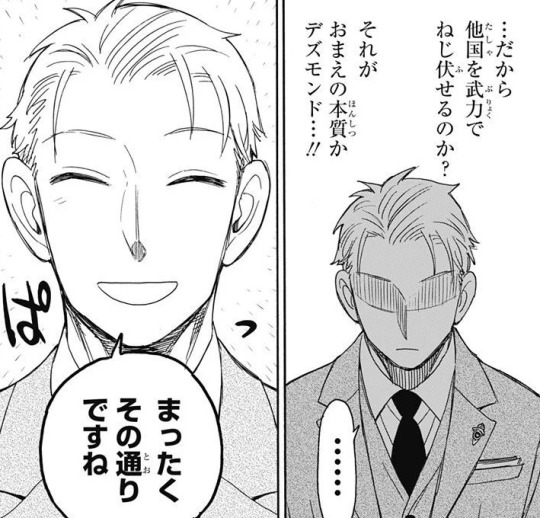
There are many different levels of speech in Japanese, ranging from super formal to totally crude. These speech levels are distinguished mostly by the pronouns the speaker chooses to use for themselves and who they're speaking to, as well as how they choose to conjugate the words they use. For example, 座ってください (suwatte kudasai), 座って (suwatte,) and 座れ (suware) all mean "sit," as in, telling someone to sit down. But the tone being conveyed is different: the first one is polite, the second one is casual, and the last one could be seen as rude if you're not using it with a close friend/family member.
As Twilight, he uses casual speech with the masculine and less polite pronoun 俺 or オレ (ore). This is the speech he uses when talking to a fellow spy like Fiona, and for his own inner thoughts.
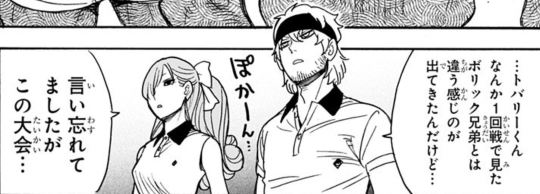
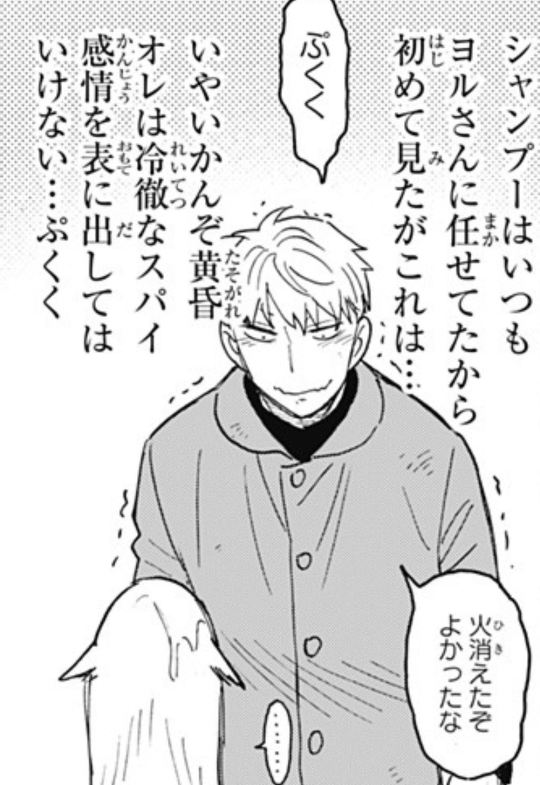
As Loid Forger, he uses the polite 敬語 (keigo) speech, which is basically comprised of using the -ます (-masu) conjugation for verbs and the "to be" verb です (desu). He also uses the pronoun ボク or 僕 (boku), which is the standard male pronoun and more polite than "ore." He uses keigo to address pretty much everyone who doesn't know his true identity. When talking to a higher-up like Sylvia, he'll still use "ore" but will use polite speech instead of casual speech.
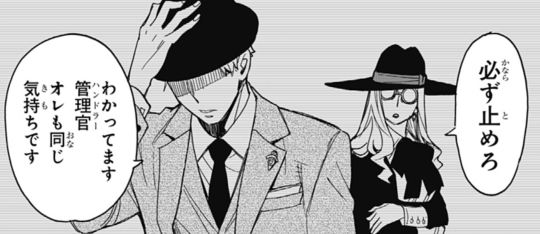
Anya is an exception to this: with her, he uses his most casual speech, the same as he uses with Franky.
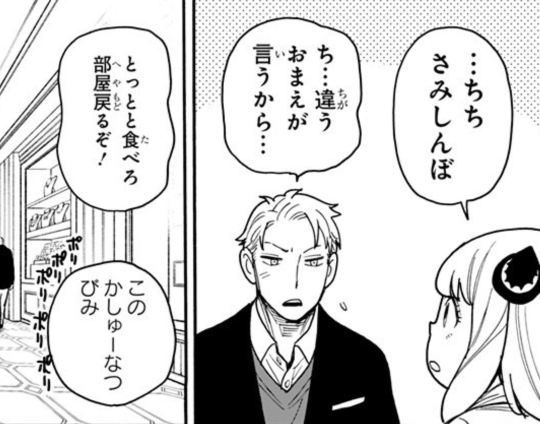
I discussed a bit about this in part 24 of my Twiyor analysis posts, but this could be because Anya is a little kid, so he doesn't feel the need to put on any airs with her (same with Bond, whom he also uses casual speech with).
An interesting side note is that, as a child, Twilight used the pronoun "boku" but then changed to "ore" as soon as he became an adult/soldier.
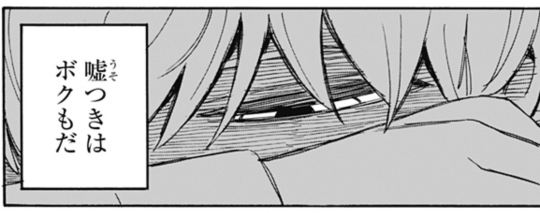
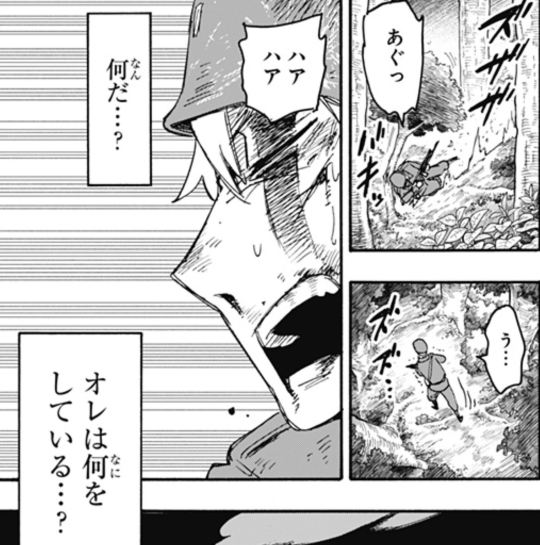
Another aspect of keigo, besides using the more polite forms of pronouns and verb conjugations, is putting the honorific さん (san) after people's names. Twilight does this all the time with Yor, as she does with him. However, he switches to casual speech and drops the "san" part in her name when addressing her in front of people who (supposedly) believe they're a real married couple, such as Yuri and Fiona – because it would be weird for a real couple who have been married for a year to address each other in such a formal way, especially the husband. In the below panel when Fiona visits them, he's calling her "Yor" instead of "Yor-san" and using casual speech instead of keigo.
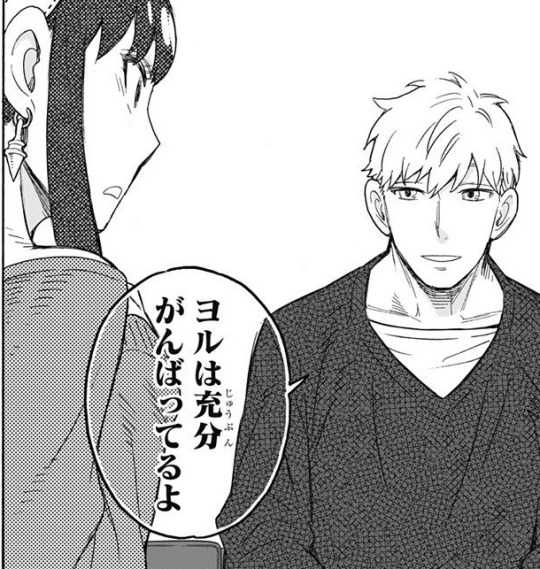
Oddly in these situations, while he uses just "Yor" when addressing her directly, he still calls her "Yor-san" when talking about her. During Yuri's first visit for example, he calls her "Yor-san" when telling Yuri how much Anya loves her (talking to someone about her) but then calls her just "Yor" a few moments later when telling her that he'll clean up the spill (talking to her directly). It's strange to me that he wouldn't just consistently use "Yor" whether he's talking to her or about her in these situations...I'm honestly not sure if he does this intentionally or if he just slips up since he's so used to using "Yor-san" in her presence.
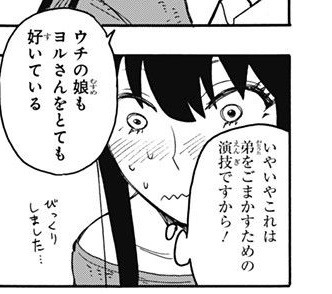
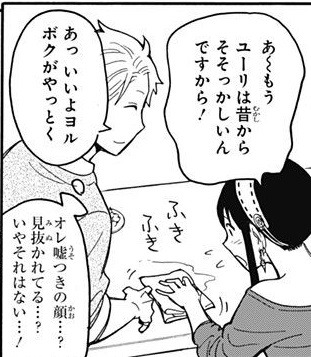
Regardless, this is why the scene in chapter 86 is so significant – when Yor isn't present, there's no reason for him to refer to her as "Yor-san," especially in front of a fellow spy like Fiona who knows he (supposedly) shouldn't have any feelings for her. Yet, even after he just called Yuri by his full name "Yuri Briar" a moment before, he doesn't do the same for Yor and continues to call her "Yor-san" here, much to Fiona's dismay.
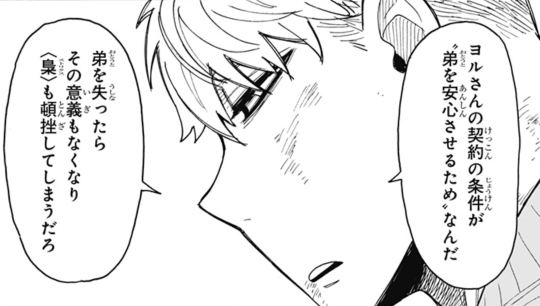
In the same chapter, it's also significant that he uses "ore" when addressing Yor directly in his thoughts. Even though he's not speaking out loud, I believe this is the first time he's speaking directly "to" her as Twilight and/or his true self and not as Loid Forger.
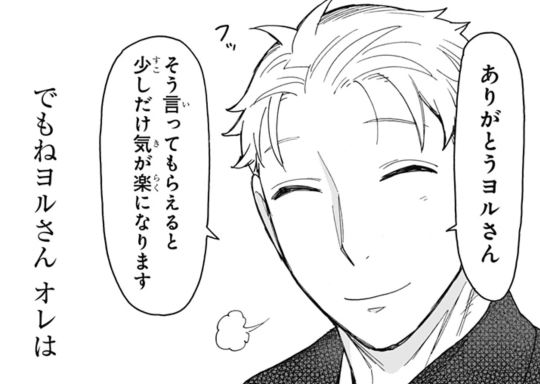
But despite all this, I think that both Loid Forger and Twilight are tatemae…they're both masks to hide the person he truly is. The person who fondly talked about his mother to Yor on the park bench, the person who genuinely expressed gratitude for her sacrifice when leaving the resort island, the person who refused to kill Yuri in a life-or-death struggle because he knew it would hurt her…that's his actual honne. But of course, the ongoing conflict of the series is that he has yet to realize this. He won't even show his honne to his closest friend, Franky. Seems like it mostly comes out in dribs and drabs during his interactions with Yor...no surprise there, lol. The man is certainly a work in progress. When he finally starts letting his "honne" show, I'm curious what form of speech he'll adopt.
-----
Continue to Part 2 ->
#spy x family#loid forger#sxf spoilers#sxf manga#Japanese#this is a good way to understand some Japanese also#very good and interesting analysis#i also noticed he switches a lot in anime#i don't read the manga in Japanese because it's a bit hard for me but i think this is very good analysis
546 notes
·
View notes
Text
In light of Duolingo laying off its translators, here are my favourite language apps (primarily for Mandarin Chinese, Japanese, and te reo Māori).
Multiple Languages
Anki is a flashcard programme and app that's not exclusively for languages. While making your own decks is ideal, you can also download shared decks for most languages.
If you're learning Japanese, specifically, Seth Clydesdale has websites for practicing alongside Genki's 2nd or 3rd editions, and he also provides his own shared Anki decks for Genki.
And if you're learning te reo Māori, specifically, here's a guide on how to make your own deck.
TOFU Learn is an app for learning vocabulary that's very similar to Anki. However, it has particularly excellent shared decks for East Asian languages. I've used it extensively for practicing 汉字. Additionally, if you're learning te reo Māori, there's a shared deck of vocabulary from Māori Made Easy!
Mandarin Chinese
Hello Chinese is a fantastic app for people at the HSK 1-4 levels. While there's a paid version, the only thing paying unlocks is access to podcast lessons, which imo are not really necessary. Without paying you still have access to all the gamified lessons which are laid out much like Duolingo's lessons. However, unlike Duolingo, Hello Chinese actually teaches grammar directly, properly teaches 汉字, and includes native audio practice.
Japanese
Renshuu is a website and app for learning and practicing Japanese. The vast majority of its content is available for free. There's also a Discord community where you can practice alongside others.
Kanji Dojo is a free and open source app for learning and practicing the stroke order of kanji. You can learn progressively by JLPT level or by Japanese grades. There's also the option to learn and practice kana stroke order as well.
10K notes
·
View notes
Text
Every time I see the ちいいさい kanji I go "awn, he's just a little guy"
You just gotta give him a mouth and then

Just a little guy
52 notes
·
View notes
Text
Japanese Phrases for Restaurants
Restaurants in Japan can be intimidating if you are unsure of your Japanese ability or how to navigate them. Here are some easy phrases to help you navigate common situations. (For more restaurant vocabulary & phrases, check my post HERE).

1. すみません sumimasen Excuse me
Usually wait staff will greet you at the entrance and guide you to a table, but if no one is there, you don't have to stand and wait forever. Using sumimasen will help to get their attention politely.
You can also use this to get the wait staff's attention. Raising your hand and calling out sumimasen will let them know you'd like them to come over.
If you don't understand something they are saying, you can also use this phrase as a question: sumimasen? They will repeat what they said or try to communicate it differently for you.
2. 二人です ふたりです futari desu For two
This phrase tells the staff that you have two people in your party. Usually they will ask you before seating you (何名様ですか? nan mei sama desu ka?) and you can use your fingers to indicate, or say one of the following:
一人です ひとりです hitori desu one person
二人です ふたりです futari desu two people
三人です さんにんです san nin desu three people
四人です よんにんです yon nin desu four people
3. おすすめは何ですか? おすすめはなんですか? osusume wa nan desu ka? What do you recommend?
Use this to get suggestions from the staff, especially if you are overwhelmed by the menu.
4. これは何ですか? これはなんですか? kore wa nan desu ka? What is this?
If you don't know what something is, ask! It beats trying to figure it out on your own as you get hungrier and hungrier.
5. これ、お願いします これ、おねがいします kore, onegai shimasu This one, please
Use this to point to something you would like, such as a photo or sample. You can also use これください (kore kudasai) which has the same meaning.
6. ベジタリアンメニューはありますか? Bejitarian menyu wa arimasu ka? Do you have a vegetarian menu?
You can use ~はありますか? (~ wa arimasu ka) to ask for various things.
7. たまごぬき、できますか? tamago nuki, dekimasu ka? Can you make it without egg?
If you have food restrictions, you can ask for menu items without certain ingredients by using ~ぬき、できますか? (~ nuki, dekimasu ka?). In my experience, often smaller restaurants won't let you change the ingredients, but you can always ask. If they can't make it without something, you can ask if they have a menu item without the ingredient by using ~ぬきのメニューはありますか? (~ nuki no menyu wa arimasu ka?) or "Do you have anything without ~?"
If you'd like to explain that you can't eat a particular ingredient, you can say ~が食べれません (~ ga taberemasen) which means "I can't eat ~."
If you have an allergy, be careful when ordering in a restaurant that serves food with your allergen. In Japanese, food allergy is 食物アレルギー (shokumotsu arerugii).
8. 持ち帰りにできますか? もちかえりにできますか? mochi kaeri ni dekimasu ka? Can I get this to go?
In most Japanese restaurants, they will not do to-go after you have started eating the meal for hygiene reasons, but you can always try asking.
9. 別々にできますか? べつべつにできますか? betsu betsu ni dekimasu ka? Can we pay separately?
Most izakaya (pubs) won't allow you to pay separately, but you can always ask.
10. ごちそうさまでした gochisou sama deshita Thank you for the meal
This phrase is used after eating in Japan, and if you use it as you leave the restaurant, you will let them know you enjoyed your meal.
#very very useful#learn japanese#japanese vocabulary#japanese#japan travel#resturant#japanese food#traveling
529 notes
·
View notes
Text
Banned hiragana from Japanese license plates and why
Most Japanese license plates have a hiragana on them, but some are banned
お (o) - looks similar to あ (a)
を(wo) - pronounced the same way as お(o)
し(shi) - the character for death (死) is also pronounced shi
へ(he) - there is another character pronounced the same way (屁) and it means fart
ん (n) - cause it is hard to pronounce on its own
#japanese vocabulary#learn japanese#my last post was about Japanese people have an intense belief in the magical power of words! this is the perfect example of it#kotodama !!
173 notes
·
View notes
Text
Giant Freaking Japanese Color List
This list’s intention is to give quite a few common-ish colors a home together in one post for learning purposes and spicing up one’s color vocabulary. For color names that don’t match their English equivalents, I’ve given what I feel is the most accurate translation of the name, plus the literal meaning of the Japanese name for the color. I’ve mostly excluded color names like
真っ黒(まっくろ)pure black
墨色(すみいろ)inky black (literally ink color)
濡れ羽色(ぬればいろ)jet black (literally wet wing color)
烏羽色(からすばいろ) glossy black (literally crow wing black)
鈍色(にぶいろ)dark, dull grey (literally dull color)
鉛色(なまりいろ)lead color (livid)
鼠色(ねずみいろ) darkish grey, like rat fur (literally rat color)
鋼色(はがねいろ)steel color (steel blue, blueish-gray)
桜色(さくらいろ)pale pink (literally cherry blossom color)
桃��(ももいろ)light pink (literally (Japanese) peach color)
岩礁色(がんしょういろ)coral reef color (darkish pink)
真っ赤(まっか)pure red
紅梅色(こうばいいろ)red Japanese plum color
紅色(べにいろ)crimson
鉄色(てついろ)reddish-black (literally iron color)
橙色(だいだいいろ)orange
茜色(あかねいろ)deep reddish-orange (like that of a sunset) (literally madder red)
柿色(かきいろ)reddish-brown (literally persimmon color)
朱色(しゅいろ)vermillion/ cinnabar
緋色(ひいろ)vermillion (often translated as scarlet)
鳥の子色(とりのこいろ)eggshell color (literally bird’s egg color)
玉子色(たまごいろ)light yellowish (literally egg color)
山吹色(やまぶきいろ)bright, golden yellow (literally mountain blow color (wish I knew about this one for my previous color post..))
黄土色(おうどいろ)yellow ochre
琥珀色(こはくいろ)amber color
萌黄色 (もえぎいろ) yellowish-green (literally sprouting yellow color)
柳色(やなぎいろ)pea green (literally willow green)
鶯色(うぐいいろ)similar to olive green, perhaps slightly lighter (literally Japanese nightingale green)
苔色(こけいろ)moss green
若草色(わかくさいろ)chartreuse, lime grren (literally young grass color)
翡翠色(ひすいいろ)jade green
千歳緑 (ちとせみどり)evergreen (literally 1,000 year green)
仙斎茶 or千歳茶 (せんさいちゃ)dark brownish-green (literally 1,000 year tea)
鴨の羽色(かものはいろ)teal (literally duck wing color)
青緑色 or 青緑(せいりょくしょく or あおみどり) turquoise/ aqua (literally blue-green color)
碧色(へきしょく)greenish-blue (sorta that sea water blue color)
真っ青(まっさお)pure blue
白殺しor 藍白 (しろころし or あいじろ)very light whitish blue (literally white killing or indigo white)
瓶覗色(かめのぞきいろ)lightish blue (literally water jug peek color)
水色(みずいろ)light blue (literally water color)
空色(そらいろ)sky blue
浅葱色(あさぎいろ)dark cyan (literally pale leek color.. ??)
縹色(はなだいろ)light blue
瑠璃色(るりいろ)cobalt blue
紺碧(こんぺき)azure
紺色(こんいろ)navy blue
勝つ色(かついろ)dark, blackish indigo (literally victory color)
藍色(あいいろ) indigo
藤色(ふじいろ)lavender (literally wisteria color)
ライラック lilac
菫色(すみれいろ)violet
葡萄色(えびいろ or ぶどういろ)dark purple, maroon (literally shrimp color or grape color respectively)
ベージュ色(ベージュいろ)beige
肌色(はだいろ)skin color
茶色(ちゃいろ)tawny brown, lightish brown (literally tea color)
狐色(きつねいろ)light brown, orangish-brown (literally fox color)
褐色(かっしょく)brown
鳶色(とびいろ)auburn (literally black kite color (a type of bird))
焦げ茶色(こげちゃいろ)dark brown (literally burnt tea brown)
銅色(あかがねいろ)copper
青銅色(せいどういろ)bronze (that sort of greenish rusted bronze) (literally blue copper/bronze color)
—-these last few are just color-related terms—-
蛍光(けいこう)fluorescent
透明(とうめい)clear
メタリック(metallic)
Alright, that about covers everything I wanted to put in this post. I shied away from including colors that are loanwords (like オリーブ色)because they are usually pretty self-explanatory. feel free to correct me if I made any errors, or add other colors you find important which I may have missed. If people make enough additions to add other advanced colors, I may end up making a part 2 for this post. Thanks for reading.
3K notes
·
View notes
Text
Japanese word of the day
いってらっしゃい (Hiragana)
行ってらっしゃい (Kanji)
pronunciation - itte-rashai

Meaning - have a good day or see you later.
Used with - family members leaving house, colleagues going for work trip, meetings etc.,
If you want to learn a bit more about the history of this word, please read more!
いっしょに日本語をべんきょうする!がんばってください!
Translation: let's study Japanese together! Let's work hard together!
Romanji: issho ni nihongo o benkyou suru! Gambatte kudasai!
I recently found out that this word which has come to mean have a good day, literally translates to "Go and come back!"
Basically the 行って (pronunciation: itte) means Go (or Journey, you will see this 行 Kanji in almost every sentence where something is leaving, going somewhere for example 行ってきます meaning "I'm going!') and (い) らしゃい (pronunciation: irashai) means come or welcome back
Basically,
行って + (い) らしゃい = Go + come back
Ko-San on Instagram explained it very well. The explanation goes like this -
In ancient Japan since there was no world order, anyone leaving on a work trip, or anything else from the village could die for various reasons. And Japanese people were firm believers of the power of words, this belief is called Kotodama. Therefore, by saying "Go and come back!" they are wishing their loved ones or colleagues a good journey.
#japanese#learning japanese#japanese vocabulary#hiragana#japan#anime#日本#日本語#kanji#katakana#spy x family#gifs#spy x family gifs#japanese word of the day#loid forger#anya forger#yor forger
50 notes
·
View notes